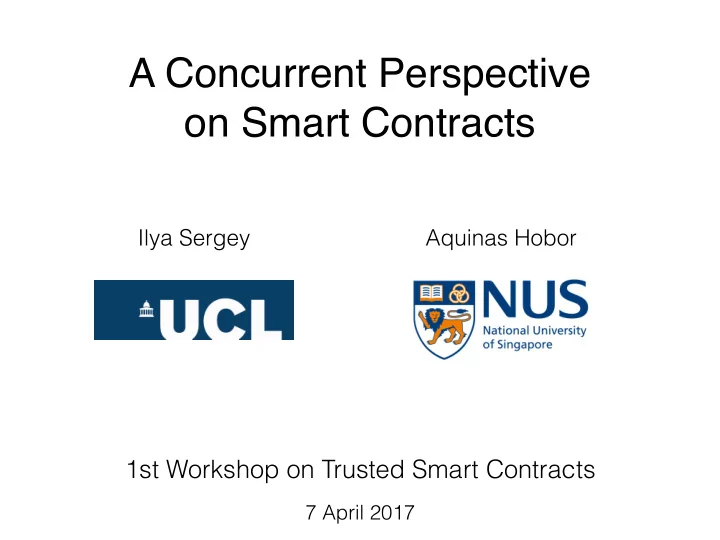

A Concurrent Perspective on Smart Contracts Ilya Sergey Aquinas Hobor 1st Workshop on Trusted Smart Contracts 7 April 2017
class ConcurrentQueue <E> { public synchronized void enqueue(E elem) {…} public synchronized E dequeue() {…} }
class ConcurrentQueue <E> { public synchronized void enqueue(E elem) {…} public synchronized E dequeue() {…} } class MyQClient { public void foo (ConcurrentQueue<Integer> q) { … q.enqueue(1); q.enqueue(2); doStuff(); Integer i = q.dequeue(); assert (i == 1); q.dequeue(); } }
class MyQClient { public void foo (ConcurrentQueue<Integer> q) { … q.enqueue(1); q.enqueue(2); doStuff(); Integer i = q.dequeue(); assert (i == 1); q.dequeue(); } } Queue q = new ConcurentQueue<Integer>(); MyQClient c1 = new MyQClient(); MyQClient c2 = new MyQClient(); || c1.foo(q) c2.foo(q)
class MyQClient { public void foo (ConcurrentQueue<Integer> q) { … q.enqueue(1); q.enqueue(2); doStuff(); Integer i = q.dequeue(); assert (i == 1); q.dequeue(); assert fails } } c1.foo(q) enq(1) enq(2) deq()=2 c2.foo(q) enq(1) enq(2) deq()=1 deq()=1
contract MyQContract { Queue q = QueueContract(0x1d11e5fbe221); function foo() { … q.enqueue(addr1); q.enqueue(addr2); someAddr.call.value(…); address i = q.dequeue(); // Assuming i == addr1 i.send(reward); q.dequeue(); } }
contract MyQContract { Queue q = QueueContract(0x1d11e5fbe221); function foo() { … q.enqueue(addr1); q.enqueue(addr2); someAddr.call.value(…); address i = q.dequeue(); // Assuming i == addr1 i.send(reward); q.dequeue(); } } Transaction mqc.foo(): enq(addr1) enq(addr2) deq() = ? someAddr(): Any manipulation with q
Accounts using smart contracts in a blockchain are like threads using concurrent objects in shared memory.
Accounts using smart contracts in a blockchain are like threads using concurrent objects in shared memory. contract state — object state call/send — context switching Reentrancy — (Un)cooperative multitasking
Reentrancy and multitasking // Burn DAO Tokens 1010 Transfer(msg.sender, 0, balances[msg.sender]); 1011 withdrawRewardFor(msg.sender); // be nice, and get his rewards 1012 totalSupply -= balances[msg.sender]; 1013 balances[msg.sender] = 0; 1014 paidOut[msg.sender] = 0; 1015 return true; 1016 } 1017
Reentrancy and multitasking // Burn DAO Tokens 1010 Transfer(msg.sender, 0, balances[msg.sender]); 1011 withdrawRewardFor(msg.sender); // be nice, and get his rewards 1012 totalSupply -= balances[msg.sender]; 1013 balances[msg.sender] = 0; 1014 paidOut[msg.sender] = 0; 1015 return true; 1016 } 1017 DAO: withdrawRewardFor() balances[msg.sender] = 0 Manipulation with DAO _recipient.call.value(…):
Inv DAO: withdrawRewardFor() balances[msg.sender] = 0 Manipulation with DAO _recipient.call.value(…): Inv (contract.state, balance) Inv Inv Inv Inv Inv Inv c.atomicMethod() c.atomicMethod() c.atomicMethod() Environment Environment
Accounts using smart contracts in a blockchain are like threads using concurrent objects in shared memory. contract state — object state call/send — context switching Reentrancy — (Un)cooperative multitasking Invariants — Atomicity
Querying an Oracle Transaction 1 Transaction 2 c.prepareRequest() o.respond() o.raiseEvent() c.__callback(data)
Querying an Oracle Block N Block N+M Transaction 1 c.prepareRequest() o.raiseEvent() Transaction 2 o.respond() c.__callback(data)
BlockKing via Oraclize function enter() { if (msg.value < 50 finney) { msg.sender.send(msg.value); return ; } warrior = msg.sender; warriorGold = msg.value; warriorBlock = block.number; bytes32 myid = oraclize_query (0, ”WolframAlpha" , "random number between 1 and 9" ); } function __callback(bytes32 myid, string result) { if (msg.sender != oraclize_cbAddress()) throw; randomNumber = uint(bytes(result)[0]) - 48; process_payment(); }
Accounts using smart contracts in a blockchain are like threads using concurrent objects in shared memory. contract state — object state call/send — context switching Reentrancy — (Un)cooperative multitasking Invariants — Atomicity Non-determinism — data races
Reasoning about High-level Behavior of Contracts (as of Concurrent Objects)
Temporal Properties Q since P ≝ ∀ s s ′ , s → c* s ′ , P(s) ⇒ Q(s, s ′ ) • “Token price only goes up”; • “No payments accepted after the quorum is reached”; • “No changes can be made after locking”; • “Consensus results are irrevocable”; • etc .
Work in Progress • A Coq-based DSL for formally defining high-level contract behavior as of a “concurrent object”; • Definitions of generic semantic contract properties; • Formal proofs for several case studies (in Coq); • Reasoning about contract/object composition; • A verified compiler from the DSL to EVM; • A compiler from Solidity to the DSL;
To take away Accounts using smart contracts in a blockchain are like threads using concurrent objects in shared memory. • Understanding intra- and inter- transactional behavior; • Detecting atomicity violations and data races ; • Repurposing existing verification ideas; Thanks!
Recommend
More recommend